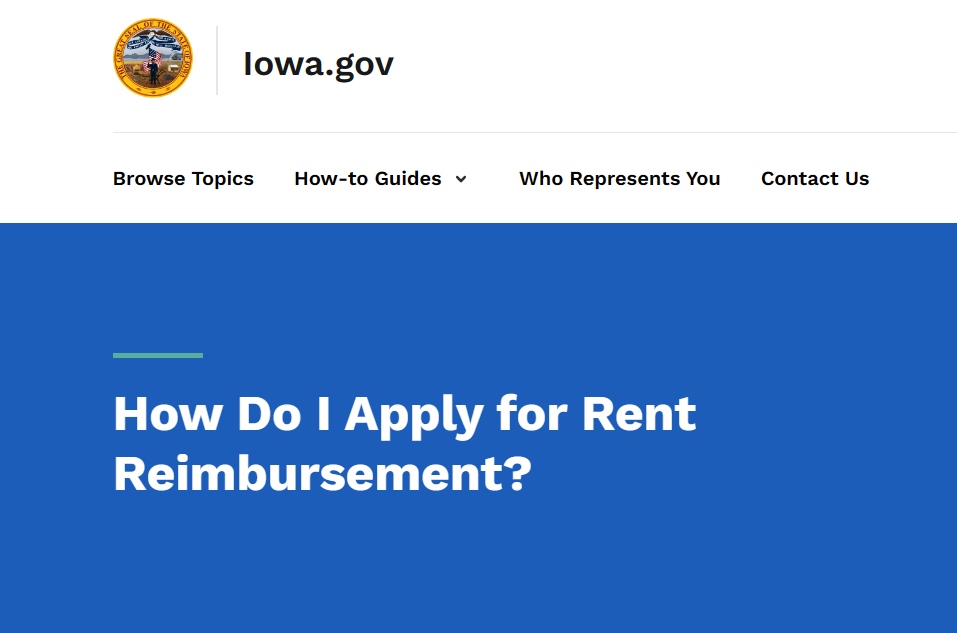Rent Rebate Application Iowa 2023 – Welcome to a comprehensive guide on the Rent Rebate Application Iowa 2023, designed to help you navigate the process of applying for rent rebates in Iowa. This article will provide you with all the necessary information and steps to ensure you maximize your savings. By the end of this guide, you’ll have a clear understanding of the eligibility requirements, application process, and benefits of the rent rebate program in Iowa.
Understanding the Rent Rebate Program
The Rent Rebate Program in Iowa is a state initiative aimed at providing financial assistance to eligible low-income individuals and families. The program offers a rebate on rent and related expenses to help alleviate the burden of housing costs. By understanding the key aspects of this program, you can determine if you qualify and take advantage of the available benefits.
To be eligible for the Rent Rebate Program, certain criteria must be met. Typically, applicants must be at least 65 years old, blind, or disabled, and have a household income below a specified threshold. Additionally, applicants must be legal residents of Iowa and not receive federal rental assistance through programs like Section 8.
The rebate amount depends on various factors, including household income, the amount of rent paid, and the number of eligible individuals in the household. This program can make a significant difference in the lives of eligible individuals and families by reducing their financial burden and improving their quality of life.
Steps to Apply for the Rent Rebate
Applying for the Rent Rebate Program in Iowa requires following a set of specific steps. By familiarizing yourself with the application process, you can ensure a smooth and efficient submission. Here’s a step-by-step guide to help you through the process:
- Gather Required Documents: Start by collecting all the necessary documents for your application. These typically include proof of age, residency, income, and rent paid. Make sure to have copies of these documents readily available to avoid delays in the application process.
- Complete the Application Form: Obtain the Rent Rebate Application form, which can usually be found on the official website of the Iowa Department of Revenue. Fill out the form accurately and provide all the requested information. Double-check for any errors or missing details to avoid potential complications.
- Submit Supporting Documents: Along with the application form, you’ll need to attach the required supporting documents. These may include copies of your identification, income statements, rent receipts, and any additional documentation requested by the program.
- Submit the Application: Once you have completed the form and gathered all the necessary documents, submit your application by the designated deadline. Make sure to review the submission instructions carefully to ensure your application is received successfully.
- Follow Up and Await Response: After submitting your application, it’s important to keep track of its progress. You can contact the Iowa Department of Revenue for updates or to address any questions you may have. It may take some time to receive a response, so it’s essential to be patient during the review process.
Benefits of the Rent Rebate Program
The Rent Rebate Program offers several benefits that can significantly improve the financial well-being of eligible individuals and families in Iowa. Let’s explore some of the key advantages of participating in this program:
- Financial Assistance: The primary benefit of the Rent Rebate Program is the financial assistance it provides. By receiving a rebate on rent and related expenses, eligible individuals can save a substantial amount of money, allowing them to allocate their resources to other essential needs such as healthcare, education, or daily living expenses.
- Reduced Housing Costs: Housing costs can be a significant burden for low-income individuals and families. The rent rebate program helps alleviate this burden by reducing the amount of money that eligible participants need to spend on housing. By receiving a rebate, individuals can free up their finances and have more disposable income for other necessities.
- Improved Quality of Life: By reducing housing costs, the rent rebate program directly contributes to improving the quality of life for eligible participants. With lower financial stress related to housing expenses, individuals can focus on other important aspects of their lives, such as healthcare, education, and personal development. This program aims to create a more stable and secure living environment for those in need.
- Support for Vulnerable Populations: The rent rebate program specifically targets vulnerable populations, including the elderly, disabled individuals, and those with visual impairments. By providing financial assistance to these groups, the program ensures that they have access to safe and affordable housing options. This support is crucial in promoting social welfare and inclusivity within the community.
- Community Stability: When individuals and families are burdened by high housing costs, it can lead to instability and displacement. The rent rebate program helps promote community stability by allowing participants to maintain their housing and remain in their neighborhoods. This stability contributes to stronger and more cohesive communities.
Tips for a Successful Rent Rebate Application
While applying for the rent rebate program, it’s essential to be thorough and accurate to increase your chances of a successful application. Here are some helpful tips to keep in mind:
- Read the Guidelines: Before starting your application, carefully review the program guidelines and eligibility requirements. Familiarize yourself with the specific criteria, income limits, and necessary documentation. This will ensure that you meet all the qualifications and provide the required information.
- Organize Your Documents: Gather and organize all the required documents, such as proof of age, residency, income, and rent payments. Having these documents readily available will streamline the application process and help you provide accurate information.
- Double-Check the Application: Before submitting your application, go through it thoroughly to check for any errors or missing information. Make sure all fields are completed accurately, and all supporting documents are attached. Even a small mistake or omission can delay the processing of your application.
- Keep Copies of Everything: Make copies of your completed application and all the supporting documents for your records. This will serve as a reference in case any issues arise during the application process.
- Follow Up and Stay Informed: After submitting your application, follow up with the Iowa Department of Revenue to ensure that your application is being processed. Stay informed about the timeline and any updates regarding your application. This will help you address any concerns or provide additional information promptly if required.
Conclusion
The Rent Rebate Application Iowa 2023 is a valuable opportunity for eligible individuals and families to reduce their housing costs and improve their financial well-being. By understanding the program, following the application process diligently, and being aware of the benefits and eligibility requirements, you can maximize your chances of a successful application. Take advantage of this program and secure the financial assistance you deserve, making a positive impact on your quality of life and overall stability. Apply for the Rent Rebate Program today and experience the benefits it brings to the residents of Iowa.

